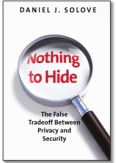 I often hear people of all ages, including children, say, “It doesn’t matter that my digital information is collected because I have nothing to hide.” What bothers me most about this comment is the limited understanding that it demonstrates — a lack of knowledge about how fast the traditional walls of privacy are tumbling down and how little of it has to do with the bad things that people do.
I often hear people of all ages, including children, say, “It doesn’t matter that my digital information is collected because I have nothing to hide.” What bothers me most about this comment is the limited understanding that it demonstrates — a lack of knowledge about how fast the traditional walls of privacy are tumbling down and how little of it has to do with the bad things that people do.
- People who make the comment usually know little about what happens to collected digital data, most of it documenting everything we do in our daily digital lives and almost none of it destined to identify wrongdoings or help to find “bad guys.” So much data is now collected about each of us in so many different ways, that almost nothing about us cannot be found out.
Our phones document where we go, our cars move through intersections with mounted cameras that note our license plates, the grocery stores keep track of the foods we prefer, and our Internet searches document the things we want to do, what we want to purchase, and often our worries about how to solve certain problems. Our data even document our medical conditions (despite physicians and insurance companies complying obsessively with HIPPA privacy rules) as we go about checking on symptoms and prescription side effects, or merely try to learn more.
So I was pleased to discover a May 2013 article, Why Privacy Matters Even If You Have Nothing to Hide, by Daniel J. Solove, a professor of law at George Washington University. In easy-to-understand terms, Professor Solove addresses the myths associated with narrow interpretations of privacy issues.
In this Chronicle of Higher Education piece, which is filled with literary illustrations (and I am more than thrilled that I’ve read all of the books he uses as examples), Solove also points out that when people offer “nothing to hide” responses they seem to be defining privacy only through the prism of surveillance rather than looking through a much wider lens of information collection that goes on minute-by-minute in our daily lives.
Privacy matters because these vast amounts of information allow others — not just huge data mining companies, but even acquaintances — to put small, seemingly unrelated pieces of a person’s life puzzle together, make assumptions and draw conclusions about each of us.
The simplest example of this is the way Google uses each person’s data to figure out what advertisements to put on our pages — topics such as weight loss and medical supplies — that we don’t necessarily want a person looking over our shoulder to see.
 It is always a good time for family members, young and old, to talk together about privacy and learn more about what it really means. But quality conversations must also help everyone, and especially 21st Century learners, to understand that privacy has a lot less to do with concealing bad behavior and much more to do with making choices about what information we want to keep to ourselves. Professor Solove’s article provides parents and young adults with the information and the context for thoughtful discussions that can include younger children.
It is always a good time for family members, young and old, to talk together about privacy and learn more about what it really means. But quality conversations must also help everyone, and especially 21st Century learners, to understand that privacy has a lot less to do with concealing bad behavior and much more to do with making choices about what information we want to keep to ourselves. Professor Solove’s article provides parents and young adults with the information and the context for thoughtful discussions that can include younger children.
You can also read his book, Nothing to Hide.

Reblogged this on Media! Tech! Parenting! and commented:
Just the other day, in a conversation about personal privacy, I overheard one adults say to another person, “I’ve got another to hide… “ I wanted to jump into the conversation, but instead I am republishing this 2013 blog post.